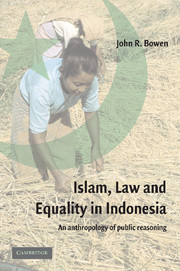Book contents
- Frontmatter
- Contents
- List of illustrations
- List of tables
- Acknowledgments
- Glossary
- Part 1 Village repertoires
- Part 2 Reasoning legally through scripture
- Part 3 Governing Muslims through family
- 8 Whose word is law?
- 9 Gender equality in the family?
- 10 Justifying religious boundaries
- 11 Public reasoning across cultural pluralism
- References
- Index
11 - Public reasoning across cultural pluralism
Published online by Cambridge University Press: 07 January 2010
- Frontmatter
- Contents
- List of illustrations
- List of tables
- Acknowledgments
- Glossary
- Part 1 Village repertoires
- Part 2 Reasoning legally through scripture
- Part 3 Governing Muslims through family
- 8 Whose word is law?
- 9 Gender equality in the family?
- 10 Justifying religious boundaries
- 11 Public reasoning across cultural pluralism
- References
- Index
Summary
“Justice is conflict,” writes Stuart Hampshire (2000), pointing to the irreducibility of certain conflicts to consensus. Justice lies in the operation of “public reason,” argues John Rawls (1999), claiming that citizens can agree on a minimal central set of principles. I find Hampshire persuasive, but I also find Rawls's challenge important. If social groups differ on the most fundamental political issues, how can they possibly coexist in a political community?
Irreducible pluralism
In the previous chapters, I have charted varied Indonesian efforts to coexist through sustained public reasoning, a restless, endless process of deliberation, intended sometimes to accommodate others, sometimes to exclude them. I began in Isak, a small enough place, where if there were to be normative resting-places in large nation-states, we might expect to find one. But Isak people, like their fellow citizens elsewhere, find themselves grappling with criss-crossing sets of norms, some of which have the backing of the state (and thus can be said to be “law”), others of which have their normative anchors in the past or the local present. The Isak case of the disputed houses, in which Aman Kerna created a web of complicated subterfuges and hedges to try and satisfy, or at least appease, everyone, dead ancestors and future judges alike, reminds us that village life is not normatively simple.
It also reminds us that law, dispute resolution backed by state authority, is only one element in a complex field of norms, feelings, livelihoods, and power.
- Type
- Chapter
- Information
- Islam, Law, and Equality in IndonesiaAn Anthropology of Public Reasoning, pp. 253 - 268Publisher: Cambridge University PressPrint publication year: 2003
- 2
- Cited by



